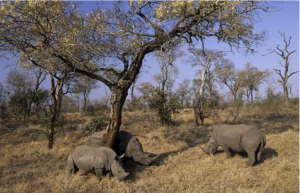By Tanya Jacobsen. Originally published on RhinoAlive.com.
Rhinos throughout South Africa are being brutally killed for their horns. In this article, I would like to focus on some of the positive contributions by the private (non-governmental) sector and the trials and tribulations that they face in trying to keep rhinos safe. This article follows our previous short article on general contributions of the private wildlife industry.
There are many articles in circulation that paint a very negative picture of private rhino owners, often citing them as greedy, uncompassionate businessmen. Although there are some bad apples in the private wildlife industry, they are certainly the minority and in general, wildlife reserve owners have chosen their lifestyles (and livelihoods) due to a love of nature, the African bushveld and wildlife. I have never met an ethical private reserve owner who doesn’t have an interest in, and a very good grasp of the grasslands, water sources, climate, birdlife, seasonal changes in vegetation, births and deaths of animals and various other environmental factors that play a role on their land. These people are the ultimate ‘greenies’, directly contributing to wildlife’s greatest threat throughout the world: loss of habitat.
As their reserves are their livelihoods and usually situated on smaller areas than our large national parks, they protect their land with adequate fences, good technology and sufficient manpower and they do so on their own dime, without requiring assistance from government or donors. Essentially, they are self- sufficient conservationists.
© Photo by Quintus Strauss
In 2016, 1054 rhinos were poached in South Africa and of these, about 160 were on private land – about 15% of the total and proof that these rhino reserves are working very hard to keep their animals safe.
The owners of rhino reserves are not the sum of the owner but rather made up of a tough, dedicated and professional team that strives for the health and well-being of many species of wildlife on the property. These people have years of experience in the bush and generally have a background in nature conservation studies – further testament to their passion for wildlife. These are the people who first come across cruelly poached rhinos and who often must deal with orphaned rhino calves, badly- injured adult rhinos and severely traumatised staff.
At present, there are about 330 private rhino reserves in South Africa and they are home to about 6500 rhinos – almost a third of the national rhino population and more rhinos than all the rest of Africa combined. Since 2008, more than 70 rhino owners have sold their rhinos and opted out of having them on their land. This is due to the ever-increasing risk to the rhinos as well as to reserve employees from armed incursions by gangs who wish to kill the rhinos for their horns. As these reserve owners are forced to get rid of their resident rhino populations, rhinos lose twice, in the opportunity to be protected and in the opportunity to establish a mini rhino population in this safe space.
The levels of cruelty seen in rhino poaching incidents leave great emotional distress in their wake, both for the animals and the people that care for them. Numerous rhino owners, wildlife veterinarians, anti-poaching teams and others involved in rhino management are starting to speak out on the effects of these incidents on the psyche – a terrible trauma to have to endure after seeing these animals grow up, play, breed and thrive on your own property.
For many rhino owners, who run close-knit and often family-operated reserves, the idea of having to endure this is enough for them to sell their rhinos on to someone else, who may be better-equipped or in a better financial situation to be able to protect rhinos.
The costs of protecting rhinos have also reached exorbitant levels, with security measures amounting to considerably more than the overall expenses of general management and conservation of rhinos. Rhino owners have spent more than R2 billion on rhino security specifically over the past 8 years. Without some means of being able to generate these funds, more and more rhino owners will sell or get rid of their rhinos.
Eco-tourism is a business option for a few private reserves such as Phinda, Shamwari, Manyoni and Kragga Kamma but tourism is seasonal and the vast majority of tourists (national and international) visit national parks rather than smaller private reserves. Some reserves allow hunting to supplement income but with regards to rhino, this is not the norm – less than 80 rhinos were hunted in SA in 2016. Ideally, the buying and selling of live animals to other rhino owners and private and national reserves (for genetic diversity/population establishment, etc) will bring in these funds but with rhinos being so costly and difficult to protect, less and less people are willing to take them on. The value of live rhinos has dropped dramatically over the past few years.
If these rhino guardians and our national parks could sell their stockpiles of horn – a sustainable natural product that is taken humanely from the rhinos – the money generated from these sales would go a long way towards keeping the rhinos and other wildlife on the reserve safe and encouraging more and more private wildlife reserve owners to invest in rhino conservation once more.


